The Guestbook
In collaboration with Musquiqui Chihying
15 min on loop, 2019, 2K video, 16:9 aspect ratio, Stereo Sound
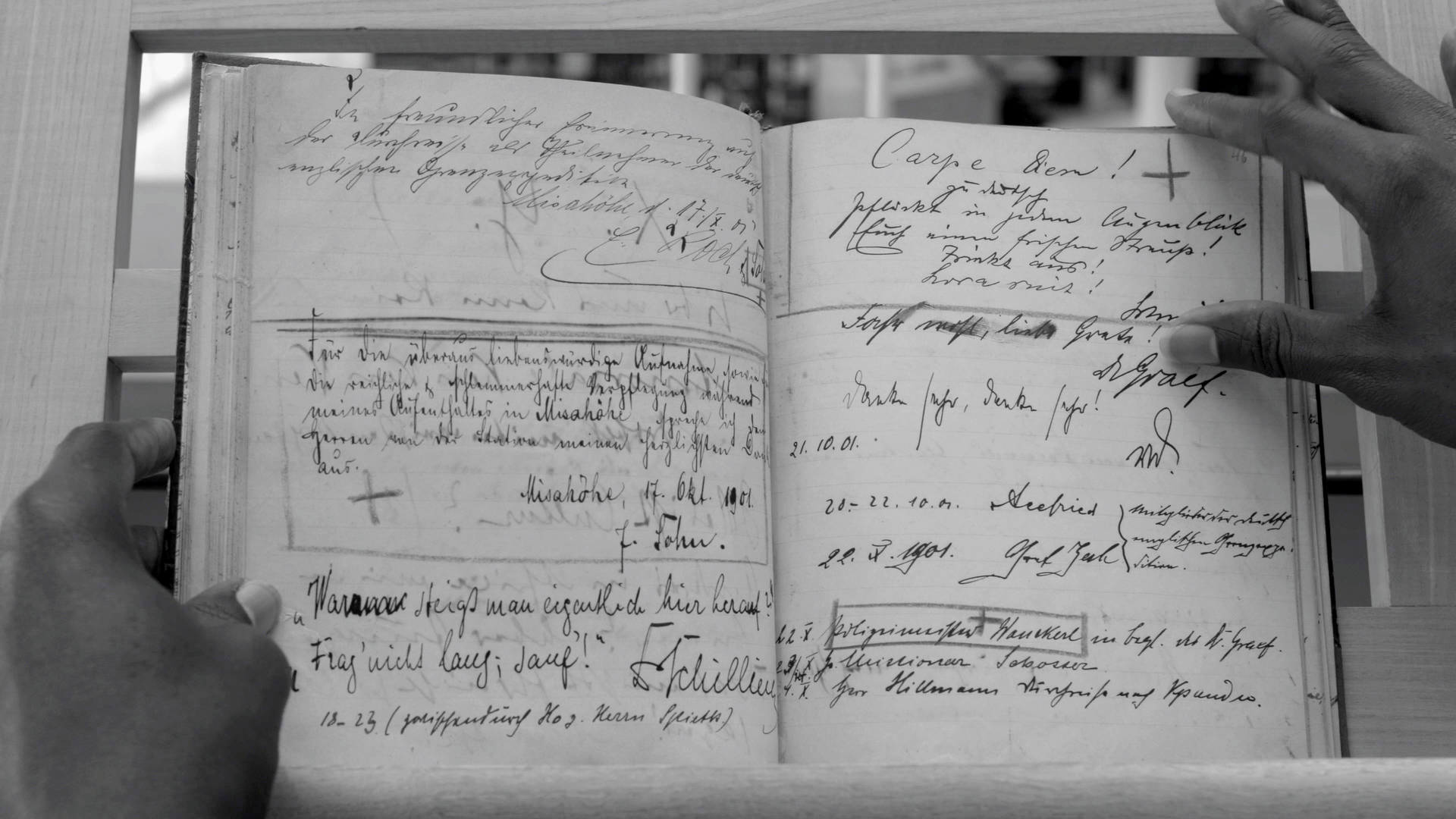
Short Synopsis
Exploring the boundaries of the documentary and fictional, The Guestbook traces stories of global interweaving of Africa, China and Europe from the time of the German Empire, the Weimar Republic and the present.
In today's Berlin, the young Togolese protagonist Dodo is in search of the old Guestbook of the former German colonial station Misahöhe, which is located in his home country.
In doing so, he encounters sounds, people and places from seemingly bygone times, which show him the reasons for the entanglements of his own life with the globalized present.
The gaze is following cautious the movements of Dodo and captures his encounters in staid black and white images, while he is telling his perceptions on a quiet voice over that seems to come out of wafting improvised jazzy piano sounds that carries lines of an unheard past.
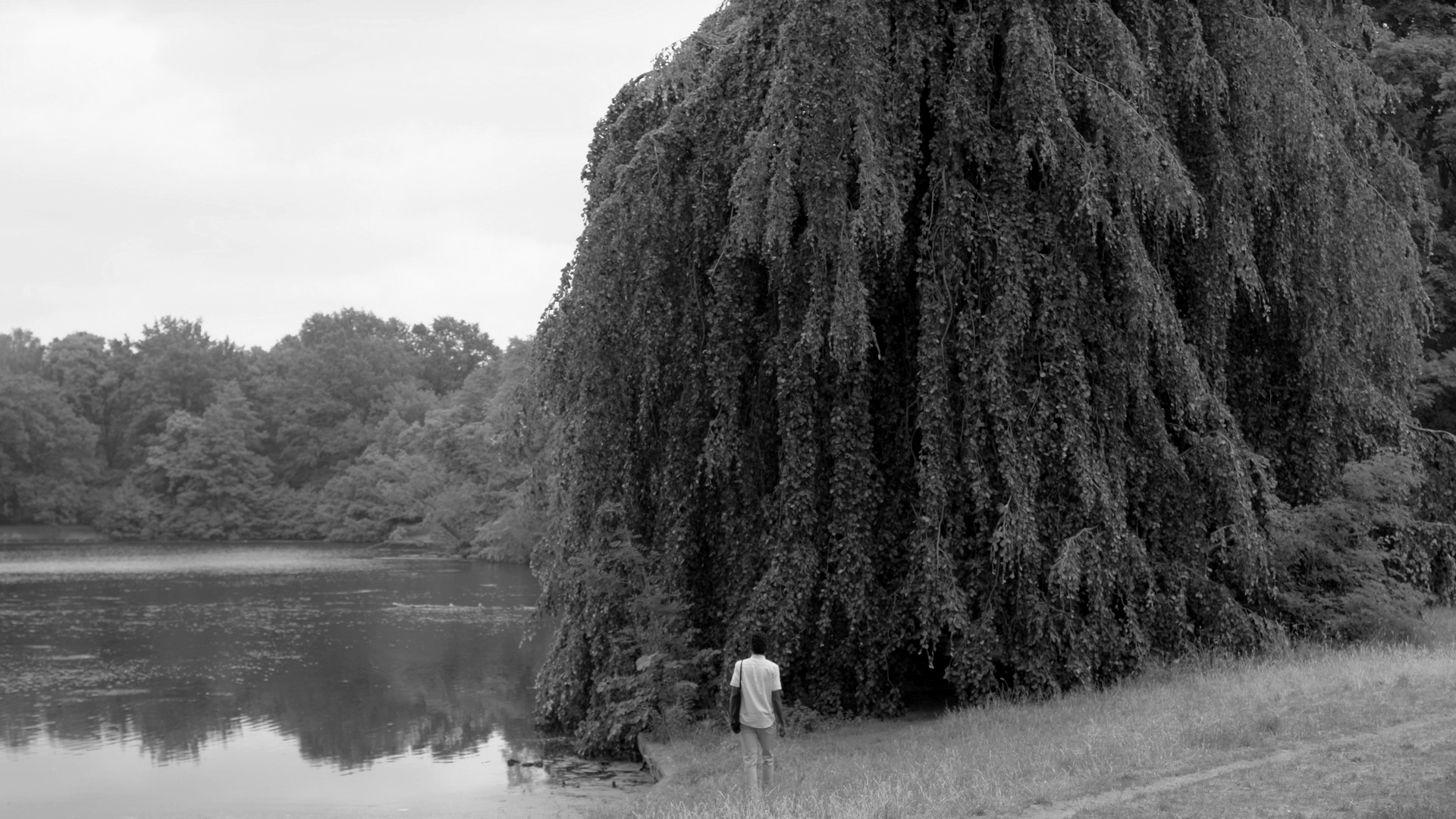

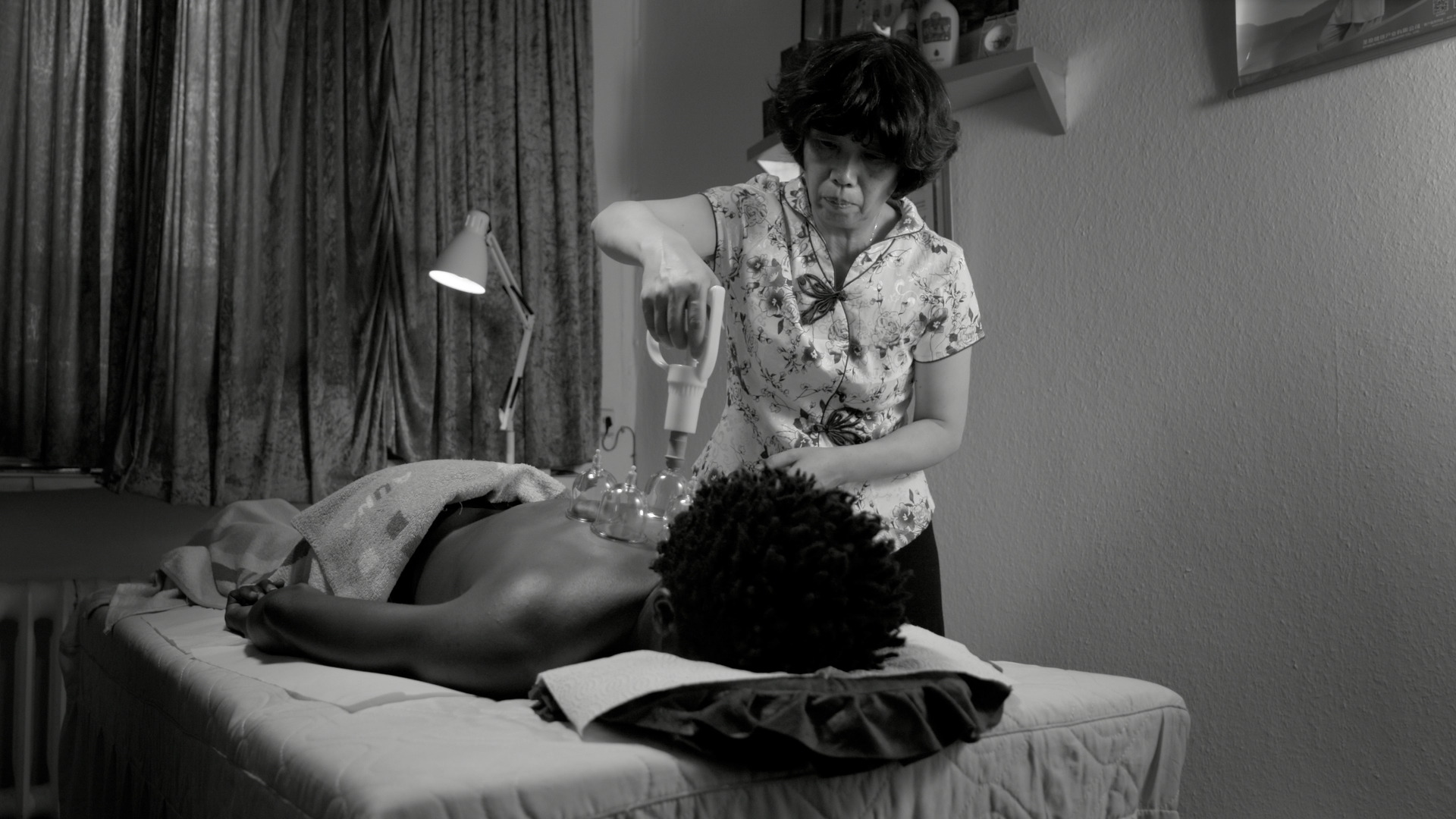
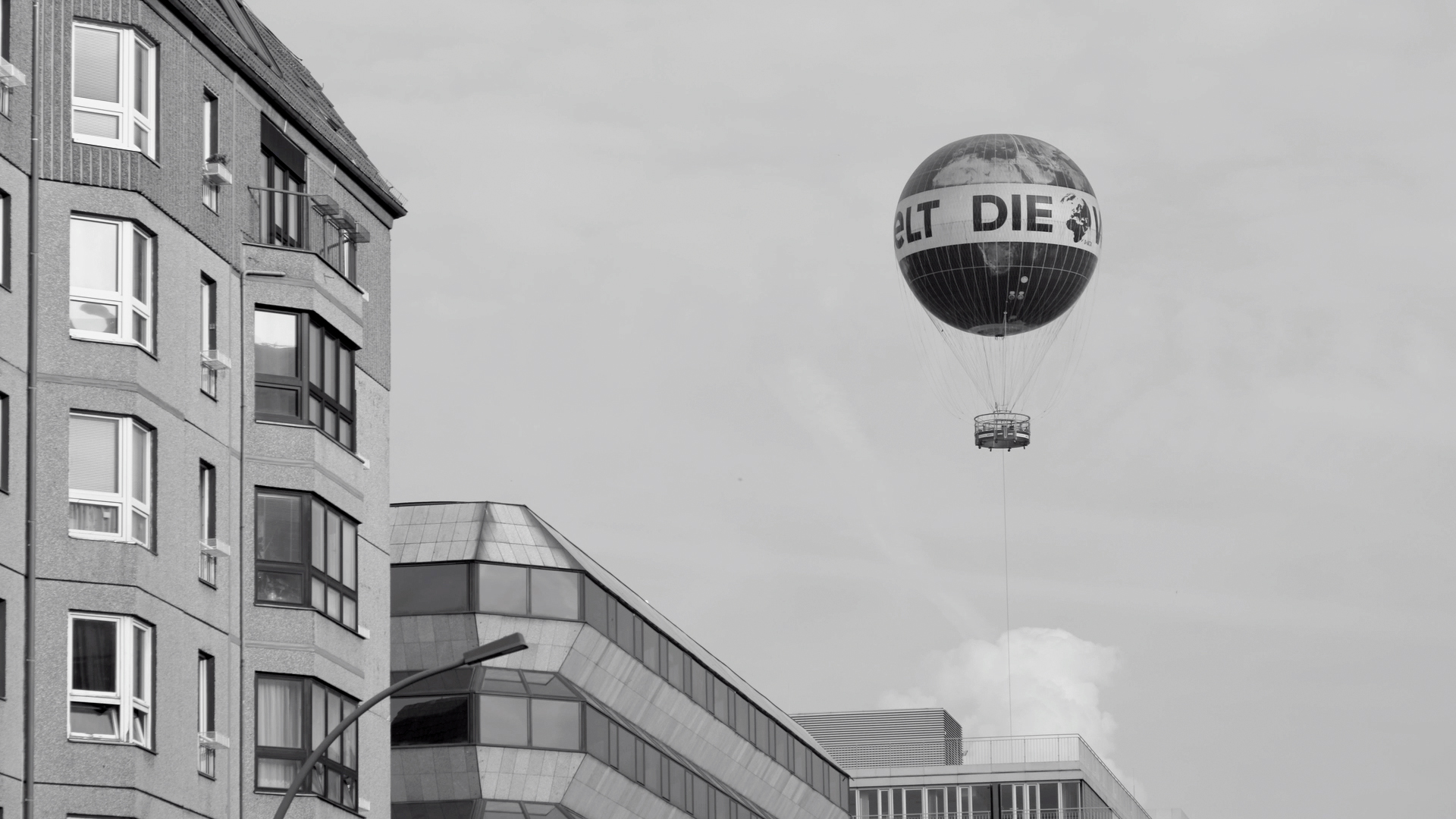
Long Synopsis
Exploring the boundaries of the documentary and fictional, The Guestbook traces stories of global interweaving of Africa, China and Europe from the time of the German Empire, the Weimar Republic and the present.
In today's Berlin, the young Togolese protagonist Dodo is in search of the old Guestbook of the former German colonial station Misahöhe, which is located in his home country.
In doing so, he encounters sounds, people and places from seemingly bygone times, which show him the reasons for the entanglements of his own life with the globalized present.
He is following signs and hints to explore three stations, that all carry parts of a hidden story:
At a lake in Treptower Park he looks for the place, where once as a child the Black German musician Kwassi Bruce had to entertain the masses at an African village, that was build to convince of the colonial project.
At a massage parlor he feels some spirit of the Chinese communist leader Zhou Enlai, who must have eaten there when it was one of Berlin’s earliest Chinese restaurants.
At the Berlin state library he is digging for old recordings, that tells him something about the reasons why he stranded in the German capital.
And more and more he gets a different understanding of why he left home, what is happening there these days and what has to be done.
The gaze is following cautious the movements of Dodo and captures his encounters in staid black and white images, while he is telling his perceptions on a quiet voice over that seems to come out of wafting improvised jazzy piano sounds that carries lines of an unheard past.
Additional Informations
The Park
Within the framework of the Great Industrial Exposition Berlin 1896, the first German Colonial Exhibition also
opened to the public in Treptower Park.
More than 100 people from the German colonies, mostly from the African continent, were „recruited“ for the
exhibition. The organizers set up a „N-village“ with traditional buildungs at the lake „Karpfenteich“ and
wanted these people to be singing and dancing exhibition objects, which could be looked by millions of
visitors as an exotic attraction.
As one of the „actors“ in this „human zoo“, Kwassi Bruce came to Berlin from Aneho (Togo) with his family,
when he was 3 years old. After 7 months of working at the exhibition, the family went on touring in Europe,
but left him in Berlin, where he grow up at the married couple Antelmann, who owned the „German
Kolonialhaus“ and who used him and other kids as a charitable image to sell their products. He was trained
as a pianist and tried to start a career in the field of classical music. But as a Black person this was very
hard – even when he officially gained the German citizenship in 1926. So to earn a living, he turned to
perform Jazz and light music and toured with his own band nationally and internationally.
After the Nazi took power in Germany and racism increased more and more extremly, Kwassi Bruce
protested against the regime and wrote a letter to the Imperial Colonial Office in 1934 to point to the precarious situation of African and Afro-German people in the society.
We don’t know that Kwassi Bruce actually ever ran into Zhou Enlai on the streets or in the night life in the
1920s. However, one thing for sure is, the opera Charlottenburger Opernhaus in Charlottenburg district,
where he worked temporary as a coach for piano, was very close to those Chinese communities on the area
around Kantstraße.
The Restaurant
The left wing movements in Germany during the first world war had a strong impression on the young
Chinese communists, it was also one of the primary trigger that brought Zhou Enlai to Berlin: attending a
memorial meeting for Rosa Luxemburg and Karl Liebknecht. During his visiting in 1922/23 three of the
earliest Chinese restaurants of Berlin were located in the Charlottenburg district: Nanking, Tientsin and
Canton – all close to the Technical University of Berlin, where many Chinese students studied. These
restaurants were the most important venues to the Chinese communities at the time, not only because of
their home-flavour food, but also as meeting points for the overseas Chinese communists to organise their
campaigns.
Today, we can see no traces of these historical places, except Nanking at the address Kantstraße 134. The
restaurant has turned into “Jia Jia O” — a China culture house, where customers can purchase souvenirs,
drinks or receive traditional Chinese style massages and treatments.
We don’t know that Zhou Enlai actually ever had a meal in Nanking. However, one thing for sure is, his
apartment in Charlottenburg district, was not far from the restaurant and he probably would not miss “Jingsu
cuisine”, the style of dishes from his hometown.
The Library
The Staatsbibliothek zu Berlin is one of the most important academic libraries in the German-speaking
regions. Its collections include publications, different media and cultural materials from mostly all time
periods of humankind and all countries of the world including a lot of connections with the Prussian and
German imperial project – for example a small guestbook („Fremdenbuch“) from the German colonial era in
the library’s Manuscripts Department. It was once used in the German colonial station „Misahöhe“ in the hilly
area of Kpalimé (Togo) between 1890 and 1910.
Although the station itself is abandoned since a long time, through the messages written on this guestbook –
and even more, by what is not written – we can still imagine the sceneries happend in this place more than
hundred years before.
Today, how to convert the abandoned buildings and how to transform the colonial structure to develop new
options for thinking and action is a significant topic for a younger generation of architects, activists and
academics in Togo.
We don’t know what will „Misahöhe“ turn into in the near future – a museum, a culture center and a hotel are
under consideration at the moment. However, one thing for sure is, the construction of the new architecture
probably will need the financial and technical support from both Europe and China.
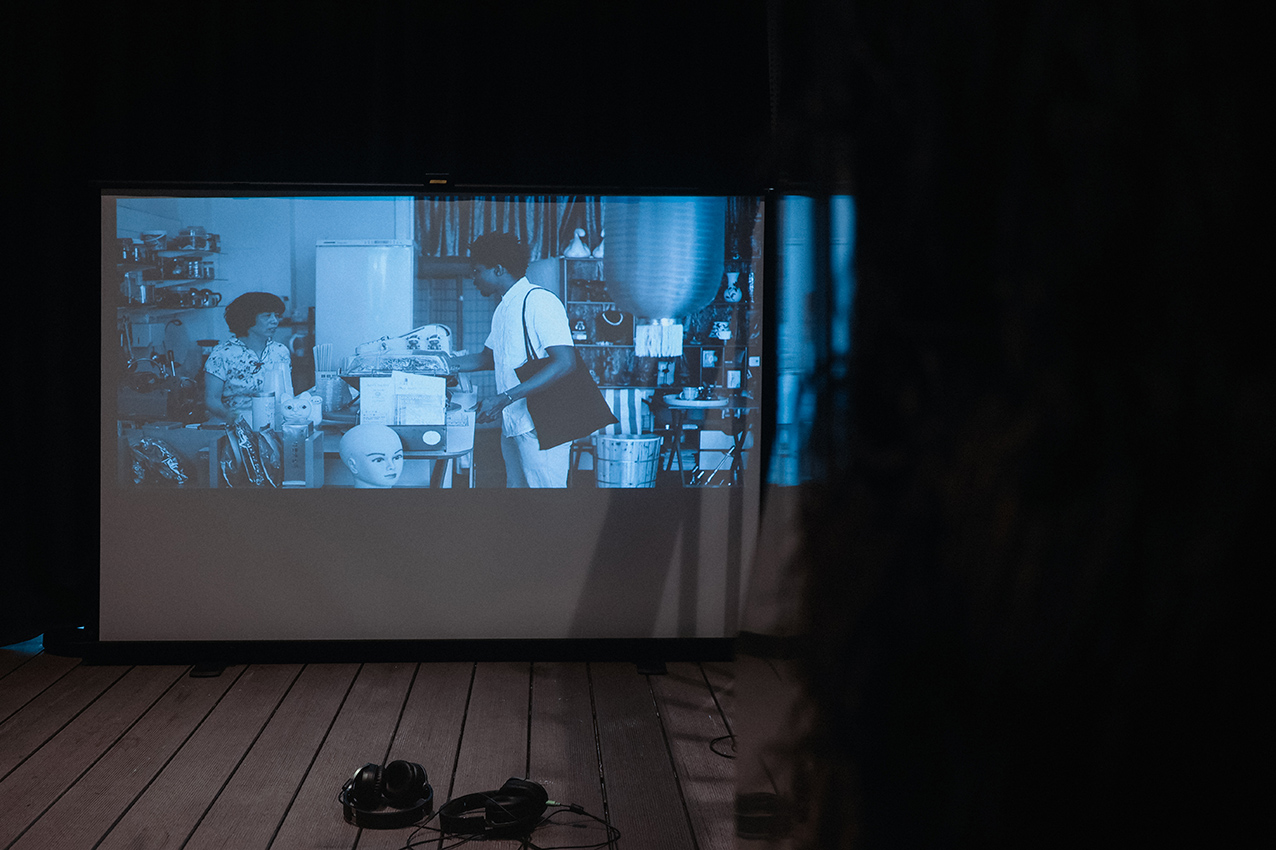
Installation View Goethe-Institut, Beijing, 2022
EXHIBITIONS
Kontrapunkte: Fokus China, Staatliche Kunstsammlungen - voices (online), Dresden, Germany, 2023
The Intimate Revolt, Goethe-Institut, Beijing, China, 2022
Kunstraum Berlin, Residenz Deutsche Botschaft, Beijing, China, 2019
New Directions - Musquiqui Chihying: I'll Be Back, Ullens Center for Contemporary Art (UCCA), Beijing, China, 2018
SCREENINGS
WRG Sensor, Braunschweig, Germany, 2023
SELECTED PRESS
"Alternative Histories and Translocal Echoes - An Interview with Musquiqui Chihying and Gregor Kasper" (voices - Staatliche Kunstsammlungen Dresden), Mia Yu, 10.2023
COLLECTIONS
KADIST, Paris / San Francisco
DISTRIBUTION
Arsenal - Institute for Film and Video Art, Berlin
CREDITS
Directed & Produced by Musquiqui Chihying & Gregor Kasper
Written by Alice Escher
Cast
Satchivi Komla Edoh, Daniel Ruiza, Xiao Quin Gu
DOP Lucas Bueno Maia
Image Editing & Color Correction Musquiqui Chihying
Sound Recording, Design, Editing, Sum-Sum Shen
Sound Mixing Ilya Selikhov
Film Score Shanti Suki Osman, Sum-Sum Shen, Ilya Selikhov, Daniel Ruiza
Production xizhuang - culture & media GbR
With the support of Ullens Center for Contemporary Art (UCCA), Beijing